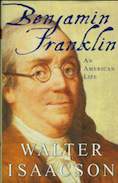
RATING: 5/10
A very factually dense biography of Benjamin Franklin. The book starts strong with a compelling narrative but fades 100 pages in or so. From here, the book is a very slow read as the narrative disappears into different factual bits. I would recommend finding a more accessible biography of Franklin.
Notes:
So convenient a thing it is to be a reasonable creature, since it enables one to find or make a reason for everything one has a mind to do.
Beginning with Collins and Ralph, Franklin easily made casual friends, intellectual companions, useful patrons, flirty admirers, and circles of genial acquaintances, but he as less good at nurturing lasting bonds that involved deep personal commitments or emotional relationships, even within his own family.
Franklin was the consummate networker. He liked to mix civic life with his social one, and he merrily leveraged both to further his business life.
Franklins key insight was that hard currency, such as silver and gold, was not the true measure of a nation’s wealth: “The riches of a country are to be valued by the quantity of labor its inhabitants are able to purchase, and not by the quantity of silver and gold they possess.”
The essence of Franklin is that he was a civic-minded man. He cared more about public behavior than inner piety, and he was more interested in building the City of Man than the City of God.
Edwards and Franklin, the two preeminent Americans of their generation, can be viewed, Carl Van Doren noted, as “symbols of the hostile movements that strove for the mastery of their age.” Edwards and the Great Awakeners sought to recommit America to the anguished spirituality of Puritanism, whereas Franklin sought to bring it into an Enlightenment era that exalted tolerance, individual merit, civic virtue, good deeds, and rationality.
As with the detailed charter he created for the Junto, Franklin was very specific about the type of subjects to be explored, which were, unsurprisingly, more practical than purely theoretical: “newly discovered plants, herbs, trees, roots, their virtues, uses, etc.;…improvements of vegetable juices, such as ciders, wines, etc.: new methods of curing or preventing disease;…improvements in any branch of mathematics…new arts, trades, and manufactures…surveys, maps and charts…methods of improving the breeds of animals…and all philosophical experiments that let light into the nature of things.”
Franklin’s print shop had by then grown into a successful, vertically integrated media conglomerate. He had a printing press, publishing house, newspaper and almanac series, and partial control of the postal system.
In describing to Collinson how metal points draw off electrical charges, Franklin ventured some theories on the underlying physics. But he admitted he had “some doubts” about these conjectures, and he added his opinion that learning how nature acted was more important than knowing the theoretical reasons why: “Nor is it much importance to us to know the manner in which nature executes her laws; it is enough if we know the law themselves. It is of real use to know that China left in the air unsuppressed will fall and break; but how it comes to fall and why it breaks are matters of speculation. It is a pleasure indeed to know them, but we can preserve our China without it.
–This attitude and his lack of grounding in theoretical math and physics, is why Franklin, ingenious as he was, was no Galileo or Newton. He was a practical experimenter more than a systematic theorist. As with his moral and religious philosophy, Franklin’s scientific work was distinguished less for its abstract theoretical sophistication than for its focus on finding out facts and putting them to use.
Franklin’s plan was that of an educational reformer taking on the rigid classicists. The new academy should not, he felt, train scholars merely to glorify God or to seek learning for its own sake. Instead, what should be cultivated was “an inclination joined with an ability to serve mankind, one’s country, friends, and family.” That, Franklin declared in conclusion, “should be indeed the great aim and end of all learning.”
The roots of much of what distinguishes the nation can be found in Franklin: its cracker-barrel humor and wisdom; its technological ingenuity; its pluralistic tolerance; his ability to weave together individualism and community cooperation; its philosophical pragmatism; its celebration of meritocratic mobility; the idealistic streak ingrained in its foreign policy; and the main street virtues that serve as foundation for its civic values.
His focus tended to be on how ordinary issues affect ordinary lives, and on how ordinary people could help build a better society.
His guiding principle was a “dislike of everything that tended to debase the spirit of the common people.”
